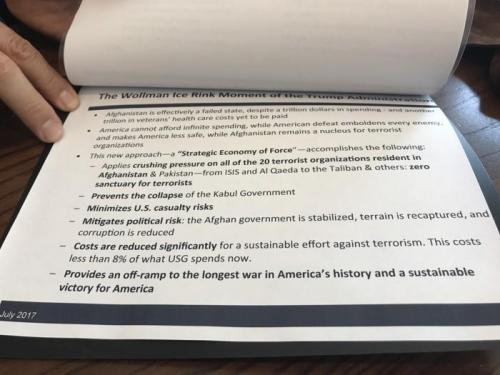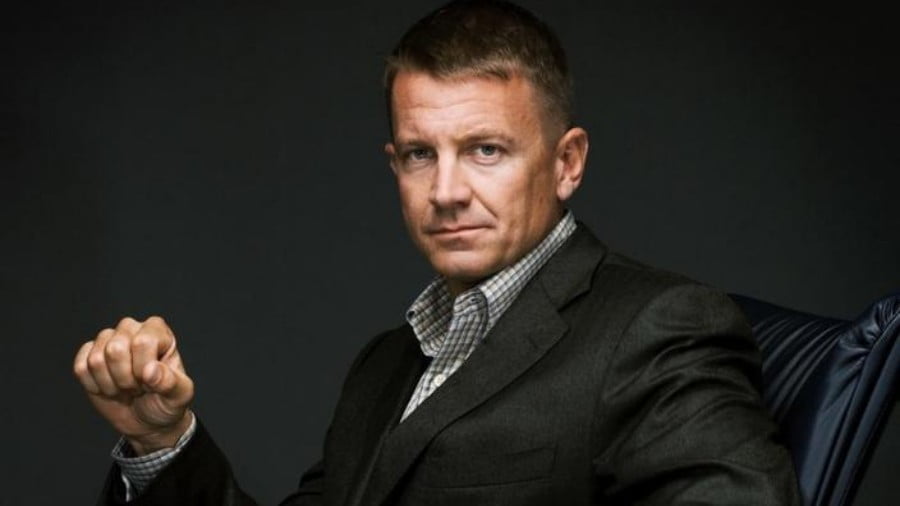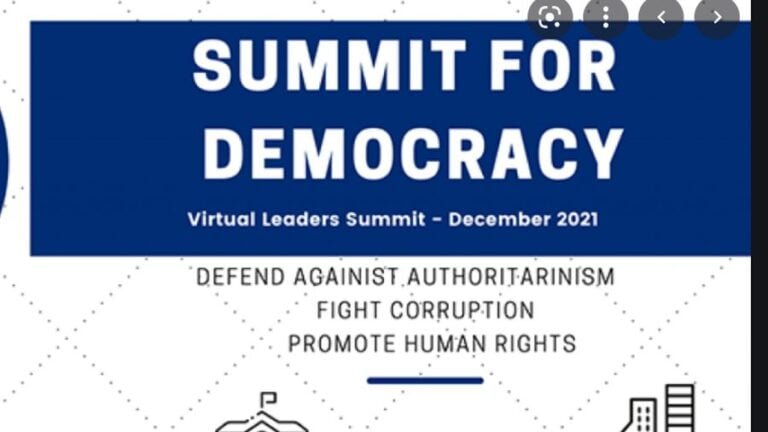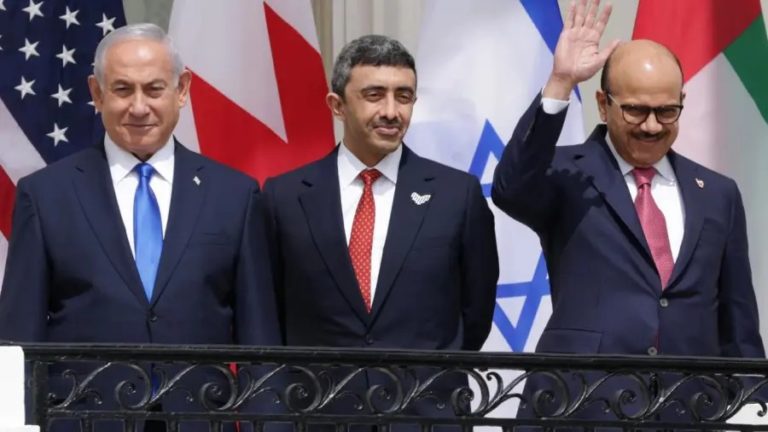Afghan “Viceroy”? Trump Mulling Blackwater Founder Erik Prince’s Plan to Privatize Longest War
Alexander the Great couldn’t do it. Genghis Khan couldn’t do it. Neither could the British Empire nor NATO and the US military machine. But Erik Prince thinks he can stabilize Afghanistan with his latest mercenary empire?
“I think it will make Erik Prince billions of dollars while he loses the war for us,” a congressional aide told The Atlanticof the Blackwater founder’s plan to privatize the war in Afghanistan.
Prince has been shopping his plan all around Washington for the past year which calls for major draw down of Pentagon train and assist forces and their replacement by private contractors, but now it appears President Trump may actually be entertaining the idea.
The Atlantic issued a detailed weekend report which reveals Trump and his top foreign policy advisors are set to consider the plan during an upcoming Camp David meeting on Friday.
Prince — the brother of billionaire Education Secretary Betsy DeVos — has over the past years since selling his mired-in-controversy Blackwater group (now Academi) begun a new mercenary empire in China called Frontier Services Group (FSG), in a market where Western firms of necessity find themselves working closely with Chinese state authorities. He’s reportedly had success in securing security and logistics contracts in Africa and China, and has since at least 2017 lobbied both top US generals and Congressional leaders to consider massive privatization of the now fast approaching two decade long quagmire.
His plan involves multiple thousands of contractors overseen by a “viceroy” reporting directly to the White House, and with a private air force to boot.
The Atlantic, which has seen the full presentation and photographed select slides, presents the details as follows:
Prince calls his proposal “A Strategic Economy of Force.” It entails sending 5,500 contractors to Afghanistan to embed with Afghan National Security Forces, and appointing a “viceroy” to oversee the whole endeavor. Prince said some version of the idea had been percolating in his mind since he first went to Afghanistan in 2002; he knew then, he said, that the Pentagon wasn’t going to be able to resolve this. But it wasn’t until the Trump administration that he felt it really had a shot; “There are some phone calls where it’s not even worth wasting the electrons on,” he said when I asked why he hadn’t proposed this idea during the Obama administration. Obama approved a substantial troop increase for Afghanistan in his first term.
Calling it the potential “Wollman Ice Rink moment of the Trump administration” in reference to Trump’s quickly rehabilitating the now iconic New York central park rink in 1986 after years of utter disrepair and millions of city dollars wasted, Prince is pitching both massively reduced American taxpayer costs and small footprint counterterror operations that will bring lasting peace to the war-torn country.
The Atlantic report continues:
Under Prince’s plan, the viceroy would be a federal official who reports to the president and is empowered to make decisions about State Department, DoD, and intelligence community functions in-country. Prince was vague about how exactly this would work and which agency would house the viceroy, but compared the job to a “bankruptcy trustee” and said the person would have full hiring and firing authority over U.S. personnel. Prince wants to embed “mentors” into Afghan battalions. These mentors would be contractors from the U.S., Britain, Canada, South Africa—“anybody with a good rugby team,” Prince quipped. Prince also wants a “composite air wing”—a private air force—to make up for deficiencies in the Afghan air capabilities.

According to multiple recent reports, the top generals and advisors overseeing Afghan war policy hate the plan, including McMaster, Mattis, and White House Chief of Staff John Kelly, as well as Tillerson, all of which worry Prince’s claimed ability to bring costs to “less than 8% of what the USG spends now” is a fantasy.
The Atlantic notes of the key objections around Washington, “One is that they believe Prince is downplaying how much it will truly cost, and the other is that they assume allies will ditch the U.S.-led effort once a switch is made to contractors instead of uniformed troops.” And critics further say that it “will lead to a moral and legal quagmire, as contractors from around the world fighting in place of U.S. forces present a host of possible problems.”
As head of Blackwater, Erik Prince’s mercenaries committed multiple war crimes in Iraq and were convicted for their involvement in the Nissour Square massacre that killed 17 civilians. He deserves an investigation, not contracts to wage a private war in Afghanistan. https://t.co/fiWy1HYTIW
— Rep. Ro Khanna (@RepRoKhanna) August 17, 2018
Like in prior Iraq scandals that nearly brought down Blackwater, there’s the questions of: “What happens if a Canadian, for example, kills an Afghan civilian while fighting as a contractor under the leadership of the American ‘viceroy’? What if the contractors get in a real bind — does the U.S. send our military in to help them?”
Prince attempted to address some of these questions and more during a Friday MSNBC appearance in which Andrea Mitchell happily gave the notorious war profiteer lengthy air time to pitch to the American public.
Meanwhile, competing for Trump’s attention is billionaire investor and Cerberus co-founder Stephen Feinberg, which counts as among his holdings mammoth military contractor DynCorp.
Feinberg’s plan for allowing the private contractor sector to shoulder the burden of security in Afghanistan has reportedly been pitched in face to face meetings with Trump in the Oval Office, something which Prince has yet to do.
According to The Atlantic:
Feinberg, on the other hand, has met with Trump, as well as with Kushner. One senior administration official said Feinberg has met more than once with Trump in the Oval Office. Through his investment firm Cerberus Capital, Feinberg controls the huge military contractor Dyncorp. He is also a confidant of Trump and has known him from business circles since before Trump became president. Feinberg was considered for a czar-type position overseeing an intelligence review earlier this year, but the idea was stymied by a vehement backlash from the intelligence community. Feinberg does not have an intelligence background.
Feinberg is proposing ideas similar to Prince’s; Prince said the two were 95 to 98 percent in agreement, though “he wrote his thing, I wrote mine.”
One source for The Atlantic report said Feinberg is “angling to be the ‘viceroy’ described in Prince’s plan.
When Prince was confronted over the obvious conflict of interest in attempting to stabilize and secure a war zone while simultaneously seeking a profit, he responded, “And let me flip that on its head even more. Before anyone throws that accusation, I think they should interview all the former generals, all the former Pentagon generals, and all the boards they serve on, and all their recommendations … advocating for the Pentagon $50 billion approach to continue on like we’ve been doing for the last 16 years. Which one is it going to be? I’m happy to have that debate.”
Or perhaps as one commentator wrote: “What if — hear me out — instead of privatizing the war in #Afghanistan, we ended it”…”Crazy, I know.”
What if – hear me out – instead of privatizing the war in #Afghanistan, we ended it. Crazy, I know. But, maybe… #EndEndlessWar https://t.co/iA3delItlb
— Stephen Miles (@SPMiles42) August 17, 2018







